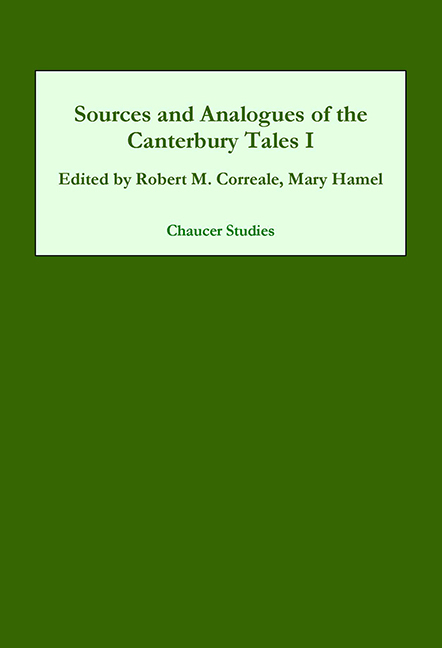Book contents
- Frontmatter
- Contents
- preface
- Acknowledgements
- The Frame
- The Reeve's Tale
- The Cook's Tale
- The Friar's Tale
- The Clerk's Tale
- The Squire's Tale
- The Franklin's Tale
- The Pardoner's Prologue and Tale
- The Tale of Melibee
- The Monk's Tale
- The Nun's Priest's Tale
- The Second Nun's Prologue and Tale
- The Parson's Tale
- Contributors and editors
- General Index
- Index of Manuscripts
The Friar's Tale
Published online by Cambridge University Press: 25 October 2017
- Frontmatter
- Contents
- preface
- Acknowledgements
- The Frame
- The Reeve's Tale
- The Cook's Tale
- The Friar's Tale
- The Clerk's Tale
- The Squire's Tale
- The Franklin's Tale
- The Pardoner's Prologue and Tale
- The Tale of Melibee
- The Monk's Tale
- The Nun's Priest's Tale
- The Second Nun's Prologue and Tale
- The Parson's Tale
- Contributors and editors
- General Index
- Index of Manuscripts
Summary
The story of the devil's seizure of a greedy lawyer or official when he is cursed by one of his own victims first occurs in writing in the early thirteenth century. Some three dozen analogues are known, from both literary and popular sources. The most important for the background of Chaucer's version are a small group of Latin exempla that are found in England in the fourteenth and early fifteenth centuries and that seem to represent a distinct English tradition of the tale.
The two earliest analogues appear at approximately the same time. One is a 224-line Middle High German poem by the Austrian poet Der Stricker, who wrote in the second quarter of the thirteenth century. Though one of the first known examples of the story, it is also one of the most sophisticated, particularly in its use of dialogue to establish the relation between the devil and his victim.
One day a rich and notoriously sinful judge rides out to visit his favorite vineyard, and on his way back he is met by the devil, who has chosen that day to seek him. The devil is very richly dressed. The judge, not recognizing him, asks who he is and where he is from, and when the devil declines to say, the judge threatens him. When he learns that he is the devil, the judge asks what his business is, and the devil replies that he is to seize that day everything that is given to him sincerely. The judge asks that he be allowed to come along and see. The devil says no, but the judge commands him in the name of God to allow him; and though the devil warns him that it will not be to his profit, the judge angrily insists on accompanying him, however much it costs. The devil at length agrees, and promises that the judge will learn something that he didn't know before, and the judge is delighted:
«nu lâ belîben dînen zorm»,
sprach der vervluochte geist,
«dâ du vil lützel umbe weist,
des vindest du noch hiute ein teil.”
dô wart er vrô unde geil,
daz er dâ wunder solde sehen;
dâ was im leide an geschehen.
- Type
- Chapter
- Information
- Sources and Analogues of the Canterbury Tales: vol. I , pp. 87 - 100Publisher: Boydell & BrewerPrint publication year: 2002



